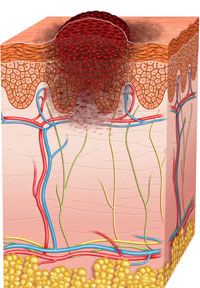FDA Approves Both Dabrafenib and Trametinib for Advanced Melanoma
The FDA approved both dabrafenib (Tafinlar) and trametinib (Mekinist) for the treatment of patients with metastatic or unresectable melanoma.
melanoma

The FDA approved both dabrafenib (Tafinlar) and trametinib (Mekinist) for the treatment of patients with metastatic or unresectable melanoma. The FDA also approved a companion diagnostic to properly identify the patients exhibiting the mutations that are targeted by these agents.
Though the drugs were approved at the same time, treat a similar group of patients, and have been studied in combination with one another, dabrafenib and trametinib are approved as single agents and not as a combination treatment. Dabrafenib is a BRAF inhibitor approved to treat patients who express theBRAFV600Emutation.Trametinib is a MEK inhibitor approved to treat patients with either theBRAF V600EorV600Kmutation. According to the FDA, approximately half of all cases of melanoma that arise in the skin exhibit aBRAFmutation.
“Advancements in our understanding of the biological pathways of a disease have allowed for the development of Tafinlar and Mekinist, the third and fourth drugs the FDA has approved for treating metastatic melanoma in the past two years,” said Richard Pazdur, MD, director of the Office of Hematology and Oncology Products in the FDA’s Center for Drug Evaluation and Research, in a statement.
The approval of dabrafenib was based upon the results of the phase III BREAK-3 trial, which were published in the journalThe Lancetlast year.1
In the BREAK-3 trial, 250 patients with aBRAF V600Emutation were randomized to receive dabrafenib (n=187) or dacarbazine (n=63). The median progression-free survival (PFS) in the dabrafenib arm was 5.1 months versus 2.7 months in the dacarbazine arm (hazard ratio [HR] = .30; 95% CI, 0.180.51;P< .0001). At the data cutoff, 57% of patients receiving dabrafenib were alive, compared with 22% in the dacarbazine arm. Adverse events that were grade 2 or higher were observed in 53% of patients receiving dabrafenib; the most common were skin-related toxic effects, fever, fatigue, arthralgia, and headache.
Trametinib was approved based on the results of the phase III METRIC trial, which were published in theNew England Journal of Medicine.2
Patients with advanced melanoma with aBRAF V600EorV600Kmutation were randomized 2:1 to receive trametinib (n=214) or chemotherapy (n=108). In the METRIC trial, the median PFS was 4.8 months in the trametinib arm versus 1.5 months in the chemotherapy arm (HR= 0.45; 95% CI, 0.33 - 0.63;P< .001). The overall survival rate at six months was 81% in the trametinib arm compared with 67% in the chemotherapy arm despite crossover (HR = 0.54; 95% CI, 0.32 - 0.92;P= .01). Common adverse events included rash, diarrhea, and peripheral edema.
The FDA also approved THxID BRAF test, a companion diagnostic used to identify patients exhibiting either theBRAF V600EorV600Kmutation.
“The co-approval of Tafinlar and Mekinist and the second companion diagnostic forBRAFmutation detection demonstrates the commitment of pharmaceutical and diagnostic partners to develop products that detect and target the molecular drivers of cancer,” said Alberto Gutierrez, PhD, director of the Office of In Vitro Diagnostic Devices and Radiological Health in the FDA’s Center for Devices and Radiological Health, in a statement.
According to the National Cancer Institute, an estimated 76,690 Americans are expected to be diagnosed with melanoma and 9,480 patients to die from the disease in 2013.
Both drugs are marketed by GlaxoSmithKline, based in Research Triangle Park, North Carolina. The companion diagnostic is manufactured by bioMérieux of Grenoble, France.
References
- Hauschild A, Grob JJ, Demidov LV, et al. Dabrafenib in BRAF-mutated metastatic melanoma: a multicentre, open-label, phase 3 randomised controlled trial.Lancet. 2012 July; 380(9839):358-65.
- Flaherty KT, Robert C, Hersey P, et al. Improved survival with MEK inhibition in BRAF-mutated melanoma.N Engl J Med. 2012 Jul;367(2):107-14.
Management of Immune-Related Toxicities in Melanoma Has Improved Over Time
April 24th 2024During a Case-Based Roundtable® event, Evan J. Lipson, MD, discussed with participants how their experience with immunotherapy toxicities has changed over time in the first article of a 2-part series.
Read More